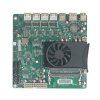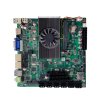Just got myself the N6005 powered NAS motherboard (https://nl.aliexpress.com/item/1005004761498719.html) amongst other resellers. Costs around $300 (less with rebates)
A couple of quick conclusions after installing Debian:
1. 64Gbytes is NOT supported, 'only' 32Gbytes, yes, I have tested this with actuall DIMMS, not just looked at the processor specs. (Edit - 64Gbytes does work)
2. The SATA ports are 'weird', one is connected to PCIe (Intel), the other 5 use a JMB585 controller, so throughput is limited, especially in RAID sets. The Jmicron JMB58x controller is also 'limited' in bandwidth to 1Gbyte/sec: LnkSta: Speed 8GT/s (ok), Width x1 (downgraded) The actual chip supports x2 PCIe lanes: PCIe Gen3 x2 to x5 SATA 6Gb/s
3. The heatsink is insufficient to keep all cores running at 3.3Ghz 100% of the time, it 'settles' to around 2.4Ghz for all cores (or is this part of the p-state settings and can be tuned?)
4. The 24+4 pin ATX connector, you have to power the +4pin with 12V, otherwise it will not start up.
5. Of the 6 advertised USB ports, 2x are 2.0 (internal to the motherboard for boot-USB sticks) 2x are 3.0 (external connector) and 2x are pin-headers, no header->port cable included.
6. ATX port-plate not included.
7. The m.2 NVME ports are PCIe 3.0 x1, so only ~1Gbyte/sec.
8. No problems so far on the Intel 226 chips, been running them at 1Gbit, not 2.5Gbit though (no 2.5Gbit switch yet).
9. With 32Gbytes and a 970EVOPlus 2Tbyte and a PicoPSU 120, I am running around 9-10W in idle. Running ~25W in full CPU load (4 cores). Measured on my lab power supply.
10.The CPU does not support i915 'interface' so possibly problematic with Plex for re-encoding.
So theoretical storage throughput is 'only' 1Gbyte/sec for each of the NVME drives, 600Mbyte/sec for one SATA port and 1Gbyte/sec for the other 5 SATA ports. On the network side we have 4x2.5Gbit ethernet, so also around 1Gbyte/sec.
A couple of quick conclusions after installing Debian:
1. 64Gbytes is NOT supported, 'only' 32Gbytes, yes, I have tested this with actuall DIMMS, not just looked at the processor specs. (Edit - 64Gbytes does work)
2. The SATA ports are 'weird', one is connected to PCIe (Intel), the other 5 use a JMB585 controller, so throughput is limited, especially in RAID sets. The Jmicron JMB58x controller is also 'limited' in bandwidth to 1Gbyte/sec: LnkSta: Speed 8GT/s (ok), Width x1 (downgraded) The actual chip supports x2 PCIe lanes: PCIe Gen3 x2 to x5 SATA 6Gb/s
3. The heatsink is insufficient to keep all cores running at 3.3Ghz 100% of the time, it 'settles' to around 2.4Ghz for all cores (or is this part of the p-state settings and can be tuned?)
4. The 24+4 pin ATX connector, you have to power the +4pin with 12V, otherwise it will not start up.
5. Of the 6 advertised USB ports, 2x are 2.0 (internal to the motherboard for boot-USB sticks) 2x are 3.0 (external connector) and 2x are pin-headers, no header->port cable included.
6. ATX port-plate not included.
7. The m.2 NVME ports are PCIe 3.0 x1, so only ~1Gbyte/sec.
8. No problems so far on the Intel 226 chips, been running them at 1Gbit, not 2.5Gbit though (no 2.5Gbit switch yet).
9. With 32Gbytes and a 970EVOPlus 2Tbyte and a PicoPSU 120, I am running around 9-10W in idle. Running ~25W in full CPU load (4 cores). Measured on my lab power supply.
10.The CPU does not support i915 'interface' so possibly problematic with Plex for re-encoding.
So theoretical storage throughput is 'only' 1Gbyte/sec for each of the NVME drives, 600Mbyte/sec for one SATA port and 1Gbyte/sec for the other 5 SATA ports. On the network side we have 4x2.5Gbit ethernet, so also around 1Gbyte/sec.
Last edited:


















